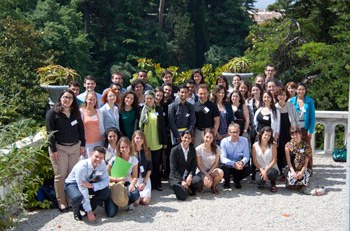The Laboratoired’Excellence Labex SIGNALIFE
welcomes 45 international students
at the University Nice Sophia Antipolis
The scientific project focuses on cell signaling to better understand how living cells communicate under normal and pathological conditions. At the core of the program is a top level, selective PhD training program, which aims to recruit some of the best French and foreign PhD students and to ultimately create a campus of excellence on cell signaling. The international PhD program is affiliated to the Graduate School for Health and Life Sciences at the University Nice Sophia Antipolis. In addition to the research project undertaken in the SIGNALIFE research teams, the students will receive interdisciplinary training, participate to international exchanges and be exposed to comprehensive range of extracurricular activities to complete the training of highest quality PhD researchers (scientific writing and presentation skills, research management…)
Each year a call for applications to recruit new SIGNALIFE PhD students will be distributed among international research institutes of highest standing all over the world. 360 applications were received for this first call for applications. After evaluation of the candidates and stringent selection, some 50 international students have been pre-selected.
The selected students were invited to a two day on-site visit on the Valrose Campus, on June 14th and 15th, 2013. They were interviewed by 32 Researchers from 6 institutes, who are affiliated to UNS and participate in the labex SIGNALIFE (Institut de BiologieValrose: iBV, Institut de PharmacologieMoléculaireetCellulaire: IPMC, Institut de Recherche sur le Cancer et le Vieillissement Nice: IRCAN, Centre Méditerranéen de MédecineMoléculaire: C3M, Institut Sophia Agrobiotech: ISA, and Inria Sophia Antipolis-Méditerranée Research Center).
On the program for those two days were the presentation of the SIGNALIFE project and the PhD program by Andreas Schedl and Robert Arkowitz (directors of the SIGNALIFE EducationCommittee), scientific presentations by each student held in the Théâtre du Grand Château on the Valrose campus and individual interviews with the researchers. The students and researchers continued their discussions over dinner at the Maison du Séminaire in Nice.
The on-site visit was a great success. UNS and the participating teams had a chance to present what they have to offer to the students, and at the same time 20 highly qualified future PhD students were selected for the first installment of the SIGNALIFE PhD program starting in September 2013.
45 étudiants internationaux accueillis à l’UNS
par le Laboratoire d’Excellence Labex SIGNALIFE

©Nissen UNS 2013
Le projet SIGNALIFE a été lauréat des Programmes Investissement d’Avenir du Ministère de l’Enseignement Supérieur et de la Recherche.
SIGNALIFE est un réseau d’excellence de 49 équipes de recherche de la région Nice Sophia Antipolis soutenues par l’Université Nice Sophia Antipolis, le CNRS, l’Inserm, l’INRA, l’Inria et impliquant le Centre Anti Cancer A. Lacassagne et le CHU de Nice. Géré par l’Université Nice Sophia Antipolis et coordonné le Dr Stéphane Noselli, le budget attribué à ce réseau de recherche et innovation est de 11 millions d’euros sur 8 ans.
Le projet scientifique porte sur la signalisation cellulaire dont l’enjeu est de mieux comprendre comment les cellules vivantes communiquent entre elles en conditions normales et pathologiques.
Le cœur de ce programme est basé sur une formation universitaire de très haut niveau avec le recrutement sélectif d’étudiants doctorants français et étrangers et la création d’un campus d’excellence sur la Signalisation Cellulaire. Ce programme de PhD international est affilié à l’Ecole Doctorale Science de la Vie et de la Santé de l’UNS. En plus de stages de recherche dans les équipes SIGNALIFE, les étudiants recevront une formation interdisciplinaire, effectueront des stages pratiques à l’étranger ainsi que des activités permettant le développement professionnel de scientifiques de haut niveau (écriture de projets et d’articles, communication scientifique, management de la recherche, etc.).
Le recrutement des étudiants SIGNALIFE s’effectue chaque année à travers un appel d’offre large à destination des meilleurs instituts de biologie internationaux sur tous les continents. Dans ce cadre, le premier appel d’offre a permis de recevoir 360 dossiers qui ont fait l’objet d’une évaluation sévère aboutissant à une présélection de 50 étudiants internationaux.
Les étudiants sélectionnés ont été invités à passer deux journées sur le Campus Valrose, les 14 et 15 juin 2013. Ils étaient accompagnés de 32 chercheurs provenant des 6 laboratoires de biologie affiliés à l’UNS, et participant au Labex SIGNALIFE (Institut de Biologie Valrose : iBV, Institut de Pharmacologie Moléculaire et Cellulaire : IPMC, Institut de Recherche sur le Cancer et le Vieillissement Nice : IRCAN, Centre Méditerranéen de Médecine Moléculaire : C3M, Institut Sophia Agrobiotech : ISA, et Inria Sophia Antipolis-Méditerranée Research Center).
Le programme de ces journées comportait une présentation du projet SIGNALIFE et du programme PhD international par Andreas Schedl et Robert Arkowitz (responsables du Comité Pédagogique du Labex), un exposé des recherches par chaque étudiant dans le Théâtre du Grand Château de Valrose suivis d’un entretien personnalisé avec les chercheurs. Les étudiants et les chercheurs SIGNALIFE ont pu continuer leurs échanges lors d’un dîner à la Maison du Séminaire à Nice.
Ces deux journées ont été un véritable succès. Elles ont permis à la fois de présenter le cadre offert par l’UNS et ses équipes et de sélectionner sur entretien les 20 meilleurs étudiants de cette 1ère vague qui pourront participer, dès la rentrée prochaine, au programme de PhD International SIGNALIFE.




